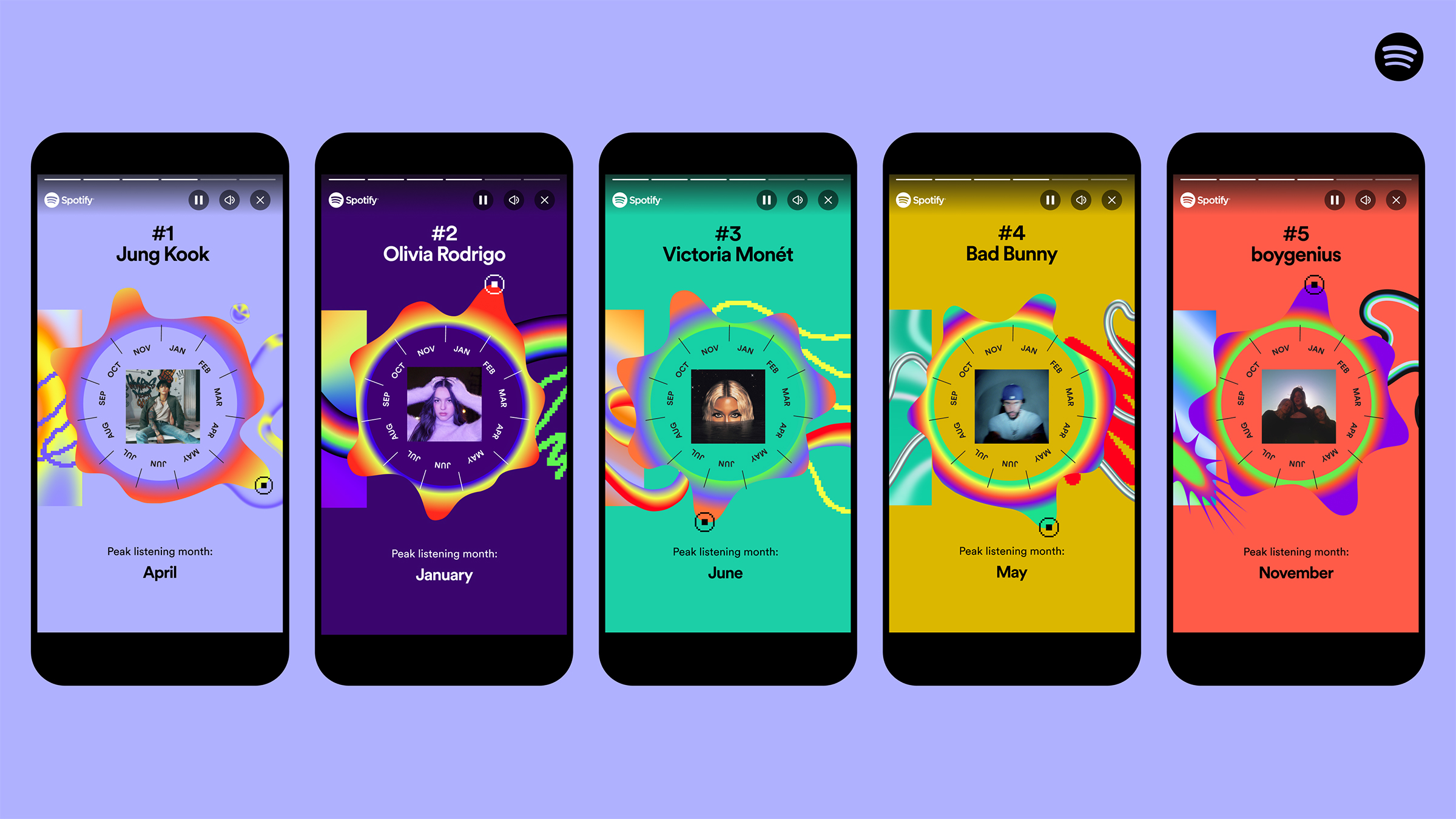
Spotify keeps receipts of what songs and artists you’ve listened to. And by year-end, the Swedish streaming giant packages your user data—be it your countless replays of Taylor Swift’s re-recorded 1989 album or BTS member Jungkook’s boppy solos—in what has since become one of its most successful and most shareable marketing ploys on social media: Spotify Wrapped.
Since its inception in 2016, many have replicated Spotify Wrapped’s campaign of individualized, annual analysis of users’ behavior: not only streaming platforms like Apple Music, but also for a variety of other industries like the Washington Post, Duolingo, Reddit, and Nintendo. Wrapped presents that analysis in customizable, jazzy graphics primed for Instagram Stories, adding another layer of authenticity and character that makes it such a viral hit.
The popularity of Spotify Wrapped has ballooned over the years: in 2017, there 30 million Spotify users accessing it, and in 2021, there were more than 120 million. That year, nearly 60 million Spotify Wrapped stories and graphics were also shared across social media platforms. The year 2022 is no different, over 156 million users engaged with Wrapped, a spokesperson tells TIME. It’s become so popular that people—even U.S. senators and Australian federal police—have piggybacked on it, and made memes of the year-end phenomenon.
With the launch of 2023 Spotify Wrapped, here’s what you need to know.
How to access Spotify Wrapped
To get the Spotify Wrapped experience, users must be subscribed to Spotify. Opening the latest version of the app is more than likely to lead users to Spotify Wrapped directly once it’s out.
But don’t fret if it doesn’t: Spotify users on desktop and on mobile can simply type in “Wrapped” in the search bar, or find Spotify’s Wrapped button in the home page.
You can also click here.
More From TIME
The math behind Spotify Wrapped
Spotify Wrapped collects data all throughout the year. A Spotify spokesperson says data used for the 2023 Wrapped spans streamed content from January to an unspecified date “a few weeks prior to launch”—Nov. 29 for this year. “We aim to leave the cutoff date as late as possible to create a truly personalized experience,” the spokesperson tells TIME. The period puts songs and albums released earlier in the year to an advantage.
For a song or podcast to be considered streamed, a user must listen to it for 30 seconds or more. The three most awaited year-end statistics—top albums, top songs, and top artists—are all based on aggregated stream counts. The list of top podcasts is assessed differently, this time based on the number of unique listeners.
Private sessions—or Spotify’s “incognito mode”—don’t count toward any list but the data from them falls under the “total minutes listened,” according to Billboard.
The 2023 winners list
Taylor Swift takes over Bad Bunny as the most-streamed artist on Spotify worldwide, with more than 26.1 global streams since January 1. Puerto Rican musician Bad Bunny held the top spot for three years since 2020, but fell to second place in the global list, followed by The Weeknd, Drake, and Mexican singer Peso Pluma.
But Swift hasn’t been able to oust Bad Bunny’s 2022 album Un Verano Sin Ti as the most-streamed album of 2023, for the second consecutive time. Her album, Midnights, ranks second, followed by SZA’s SOS.
The most-streamed song of the year in the world is “Flowers” by Miley Cyrus, with more than 1.6 billion global streams. “Kill Bill” by SZA and “As It Was” by Harry Styles fall in second and third place respectively, with Jungkook’s “Seven (feat. Latto)” and Ella Baila Sola” by Peso Pluma and Eslabon Armado to round out the list.
“The Joe Rogan Experience” remains the most consumed Spotify podcast for the fourth time running.
How Spotify Wrapped became so popular
Back in 2013, Spotify launched its first year-end review, aptly named “Year in Review” after realizing it had a trove of streaming data at its disposal. The graphics were on brand but not as kitschy as they are today, yet they still piqued audience interest.
By 2016, Spotify called the data stories Wrapped. Every iteration, Spotify Wrapped introduces quirky features also based on the data it's collected from users—ranging from detecting your supposed “audio auras” to being classified under 16 “listening personality types.” This year, Spotify Wrapped would have the features named “Me in 2033” which assigns a “listening character” that best describes your streaming habits, and “Sound Town” which matches users to a city based on their listening and shared artist affinity. It’s these creative data presentations that have been made shareable across social media platforms.
The fanfare is not just on the user side: creators are also active in promoting Spotify Wrapped. In 2022, artists recorded special messages for their listeners who placed them on the platform’s toplists. Celebrities like Dionne Warwick, John Mayer, and Lizzo have also jumped on the bandwagon of talking about the campaign.
In an interview with Variety in 2021, Spotify vice president and global executive creative director Alex Bodman said: “I’m sure we’d all love to sit down and say it was a marketing stroke of genius, but when it was first built it was a loyalty play. I don’t think we had any idea that people would want to share it so much.”
Correction, Dec. 6
The original version of this story misstated what Spotify counts as one stream. It is 30 seconds, not minutes.
More Must-Reads from TIME
- Cybersecurity Experts Are Sounding the Alarm on DOGE
- Meet the 2025 Women of the Year
- The Harsh Truth About Disability Inclusion
- Why Do More Young Adults Have Cancer?
- Colman Domingo Leads With Radical Love
- How to Get Better at Doing Things Alone
- Michelle Zauner Stares Down the Darkness
Contact us at letters@time.com